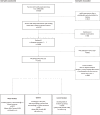Weight gain and risk of impaired fasting glucose after smoking cessation
- PMID: 22001544
- PMCID: PMC3899459
- DOI: 10.2188/jea.je20110010
Weight gain and risk of impaired fasting glucose after smoking cessation
Abstract
Background: Observation of early changes in fasting plasma glucose level induced by post-smoking cessation weight gain is useful in predicting the risks of diabetes mellitus (DM) and impaired fasting glucose (IFG). We investigated the effect of post-smoking cessation weight gain on early changes in the risk of a high fasting plasma glucose (IFG) level (≥100 mg/dL).
Methods: In 946 subjects who underwent repeated health examinations after smoking cessation, changes in body mass index (BMI) and the odds ratio (OR) for IFG risk (adjusted for sex, age, BMI, fasting plasma glucose at year 1, and alcohol consumption) were calculated every year for 3 years after smoking cessation.
Results: After smoking cessation, the rate of BMI increase significantly increased in quitters: 2.36% at year 2 (never smokers: 0.22%, current smokers: 0.39%) and 0.46% at year 3 (never smokers: 0.14%, current smokers: 0.32%). However, it decreased by 0.15% at year 4 (never smokers: 0.12%, current smokers: 0.26%). The ORs for quitters did not significantly increase at any time during the follow-up period. However, among quitters who had smoked at least 20 cigarettes per day, it was significantly higher (OR 1.51, 95% confidence interval 1.1-2.01 at year 1 and 1.71, 1.23-2.38 at year 2).
Conclusions: The time course of the risk of IFG after smoking cessation was similar to that for the rate of BMI increase. In contrast to the findings of previous reports, the increase in IFG risk after smoking cessation was brief and disappeared in the absence of a significant increase in BMI.
Figures


Similar articles
-
Smoking cessation and the incidence of pre-diabetes and type 2 diabetes: a cohort study.J Diabetes Complications. 2016 Jan-Feb;30(1):43-8. doi: 10.1016/j.jdiacomp.2015.10.005. Epub 2015 Oct 22. J Diabetes Complications. 2016. PMID: 26547408
-
Smoking cessation and the risk of diabetes mellitus and impaired fasting glucose: three-year outcomes after a quit attempt.PLoS One. 2014 Jun 3;9(6):e98278. doi: 10.1371/journal.pone.0098278. eCollection 2014. PLoS One. 2014. PMID: 24893290 Free PMC article. Clinical Trial.
-
Smoking cessation and risk of type 2 diabetes mellitus: Korea Medical Insurance Corporation Study.Eur J Cardiovasc Prev Rehabil. 2007 Apr;14(2):244-9. doi: 10.1097/01.hjr.0000239474.41379.79. Eur J Cardiovasc Prev Rehabil. 2007. PMID: 17446803
-
Body mass decrease after initial gain following smoking cessation.Int J Epidemiol. 1998 Dec;27(6):984-8. doi: 10.1093/ije/27.6.984. Int J Epidemiol. 1998. PMID: 10024192
-
Identification of Risk Factors Affecting Impaired Fasting Glucose and Diabetes in Adult Patients from Northeast China.Int J Environ Res Public Health. 2015 Oct 12;12(10):12662-78. doi: 10.3390/ijerph121012662. Int J Environ Res Public Health. 2015. PMID: 26473900 Free PMC article.
Cited by
-
Smoking Cessation, Weight Gain, and the Trajectory of Estimated Risk of Coronary Heart Disease: 8-Year Follow-up From a Prospective Cohort Study.Nicotine Tob Res. 2021 Jan 7;23(1):85-91. doi: 10.1093/ntr/ntz165. Nicotine Tob Res. 2021. PMID: 31504860 Free PMC article.
-
Analysis of factors that determine weight gain during smoking cessation therapy.PLoS One. 2013 Aug 21;8(8):e72010. doi: 10.1371/journal.pone.0072010. eCollection 2013. PLoS One. 2013. PMID: 23991026 Free PMC article.
-
Postcessation weight gain concern as a barrier to smoking cessation: Assessment considerations and future directions.Addict Behav. 2018 Jan;76:250-257. doi: 10.1016/j.addbeh.2017.08.022. Epub 2017 Aug 24. Addict Behav. 2018. PMID: 28865363 Free PMC article. Review.
-
Nutritional status of HIV-positive patients in Niterói, Rio de Janeiro, Brazil.J Health Popul Nutr. 2014 Dec;32(4):595-9. J Health Popul Nutr. 2014. PMID: 25895192 Free PMC article.
-
Analysis of changes on adiponectin levels and abdominal obesity after smoking cessation.PLoS One. 2018 Aug 7;13(8):e0201244. doi: 10.1371/journal.pone.0201244. eCollection 2018. PLoS One. 2018. PMID: 30086171 Free PMC article.

